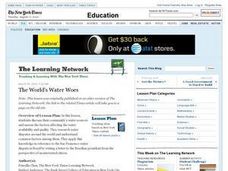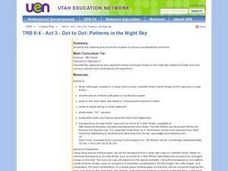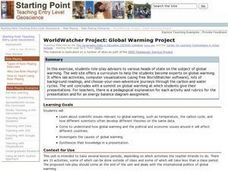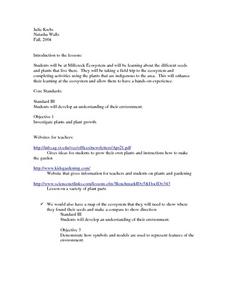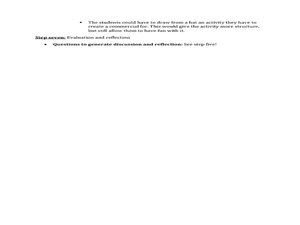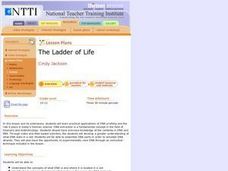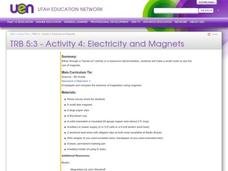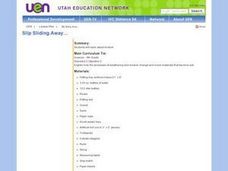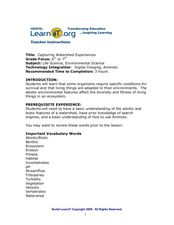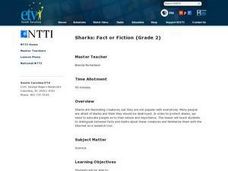Curated OER
The World's Water Woes
Students discuss their community's water sources and assess the factors affecting the water availability and quality. They research water disputes around the world and explain common factors among them.
Curated OER
Dot to Dot: Patterns in the Night Sky
Sixth graders are introduced to several major constellations and locate them in the night sky. They graph the constellations on grid paper and work in groups to research common myths and stories associated with specific constellations.
Curated OER
WorldWatcher Project: Global Warming Project
Students conduct lab activities, computer visualizations, and other various forms of research in preparation for a role-play activity in which they assume the identities of advisors to various heads of state on the subject of global...
Curated OER
Spear Point Production
Students explore that prehistoric people had to have a good knowledge of the physical world around them in order to choose the best material for spear production. They also explore that prehistoric people were intelligent beings who...
Curated OER
Ecosystem Field Trip
Students investigate the different seeds and plants that are part of the Millcreek ecosystem. They take a field trip to the ecosystem and complete activities using the plants that are indigenous to the area.
Curated OER
Frog and Toad Are Confusing
Third graders are introduced to the similiarties and differences between a frog and a toad. In groups, they compare and contrast them and identify distinguishing characteristics of each. They watch a video on the animals and answer...
Curated OER
Sea Horse Body Parts
Students complete a diagram of sea horse body parts. In this sea horse activity, students review the story Sea Horses A True Book, complete a sea horse diagram using Internet sights to help, make new entries in their KWL charts and...
Curated OER
Ben Franklin's Inventions
Students discover the life of Benjamin Franklin by studying his inventions. In this biography lesson, students identify the inventions of Benjamin Franklin and their impact on society today. Students create a commercial in an...
Curated OER
The Ladder of Life
Students explain the concepts of what DNA is and where it is located in a cell, identify the two types of molecules that make up the rungs of a DNA molecule and identify the two types of Purine and Pyrimidine molecules
Curated OER
Electricity and Magnets
Fifth graders find examples of magnets in or around their homes and make a list. They discover that some motors use magnets and make a simple motor using magnets, a battery and copper wire. They add to their magnet list.
Curated OER
Reduce, Reuse, Recycle
Students understand the process of recycling. They investigate how it improves the environment. They read the story "Don't Pollute" by Stan and Jan Berenstein. They analyze trash and sort it into bins.
Curated OER
Seasons Culminating Activity
Students develop a PowerPoint presentation as the culminating project in a unit on seasons. They complete a KWL chart, conduct Internet research, take an online quiz, and create a PowerPoint presentation using text, video clips, and...
Curated OER
Not Just A Bag of Air
Fifth graders label the parts of the respiratory system. They distinguish among the functions of its major organs. They construct a model of the respiratory system. They watch an animated video and utilize the Internet for research of...
Curated OER
Flower Power
Students explore the parts of flowers and how they reproduce. They dissect flowers and observe the reproductive organs. Students observe anthers and ovaries of Tiger Lilies under a microscope. They investigate how insects and other...
Curated OER
Who Eats Whom in the Salt Marsh?
Seventh graders complete a virtual online salt marsh tour. In groups, they observe and identify the various types of animals found in the marsh. After categorizing the animals, they create a food web based on the animals role in the...
Curated OER
Will the Lights Go Out?
Learners diagram nuclear power plant, describe process for generating electrical power, discuss nuclear disasters in the 20th century, and draw conclusion about value of nuclear power for the future.
Curated OER
Erosion: Slip Sliding Away
Fourth graders investigate the causes of erosion. Through several demonstrations including one using sugar cubes and warm water, they observe the effects of erosion. In groups, 4th graders conduct similar experiments and record their...
Curated OER
Fossil Formation Fun
Students compare the three types of fossils: preserved organisms, mineral replacement fossils, and impression fossils. They create a model of amber,
sponge fossil, and make traces of fossil.
Curated OER
African American Inventors Society
Students examine the inventions of African Americans and how their inventions contributed to the common good. In this African American inventions lesson, students research the inventions of African Americans and reflect on how that...
Curated OER
Keeping Pets Safe in an Emergency
Students discuss what ifs with relation to their pets. For this keeping pets safe lesson, students create lists of pet items needed in case of disasters. Students complete worksheets related to pet safety in emergencies.
Curated OER
Arthropods at Home- Spider, Isopod, or Any Arthropod
Students design a habitat for an arthropod. For this organisms lesson, students read the book, A House is a House For Me. Students find an arthropod and create a terrarium.
Curated OER
Capturing Watershed Experiences
Young scholars observe organisms found in the water. In this lesson plan on organisms, students collect water from local streams and tributaries in order to study the organisms found in the water. As a culminating activity, young...
Curated OER
Sharks: Fact or Fiction
Second graders discover the truth about sharks. For this shark lesson, 2nd graders use different resources to help distinguish between fact and fiction with what they have heard about sharks. They complete an attached activity sheet.
Curated OER
Traveling the Planets!
Fourth graders research the planets and create brochures to share their information. In this planets lesson, 4th graders navigate the Internet to gather information for a brochure about an imaginary trip to their planet....
